Business Law Assignment: Contracts, Sales, Employment Law
VerifiedAdded on 2022/09/25
|10
|1725
|17
Homework Assignment
AI Summary
This business law assignment addresses several key legal issues. Question 1 examines the enforceability of a contract related to the sale of a house, referencing the Contracts Act 1950. Question 2 analyzes the legal position of parties involved in a hire-purchase agreement, applying the Hire-Purchase Act 1967. Question 3 discusses implied conditions and warranties in sales contracts, citing the Sale of Goods Act 1957. Question 4 explores the application of the Hire-Purchase Act 1967 to consumer goods and motor vehicles. Finally, Question 5 delves into the Employment Act 1955, focusing on the 'multiple test' to determine employee status, referencing the Bata Shoe Company case.
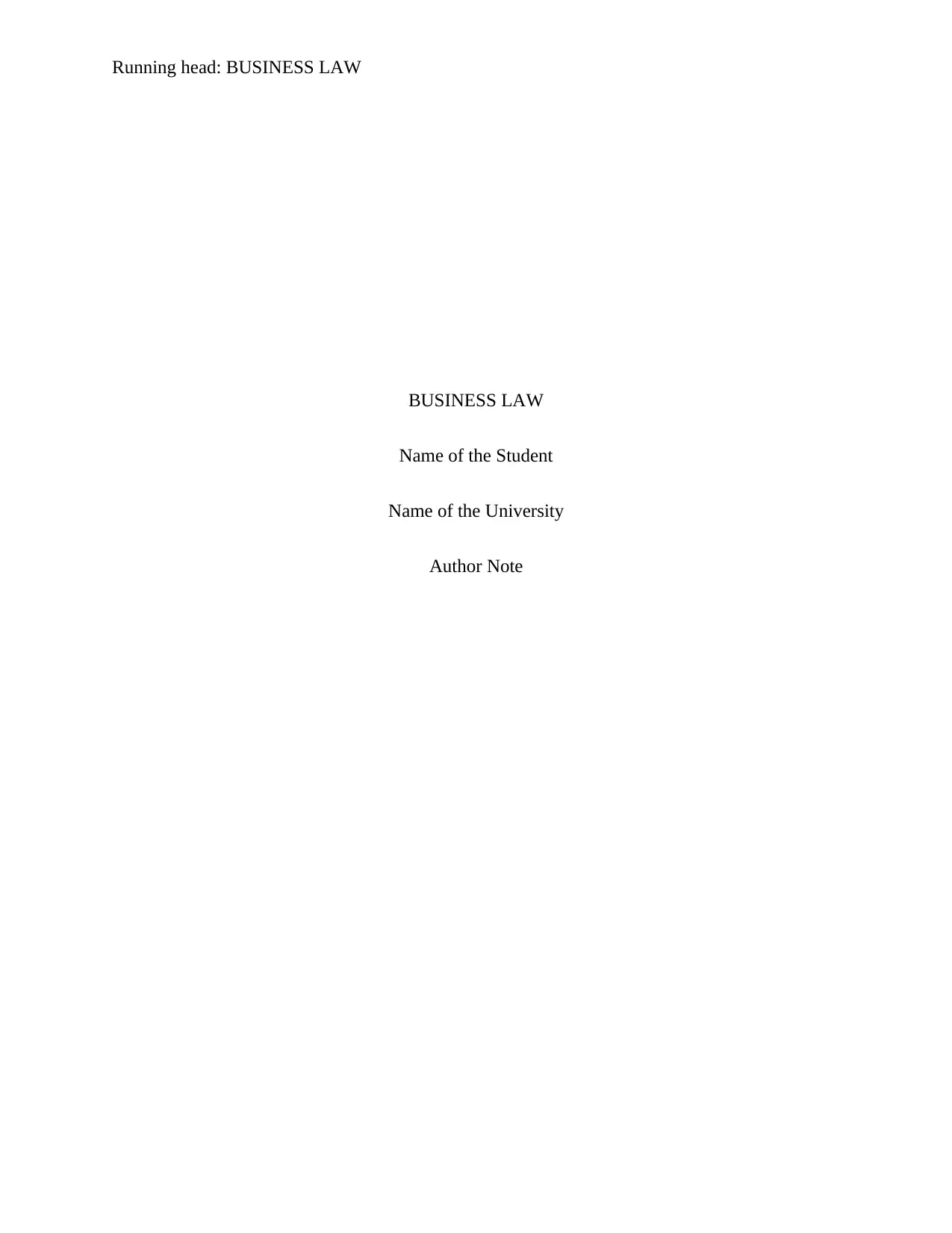
Running head: BUSINESS LAW
BUSINESS LAW
Name of the Student
Name of the University
Author Note
BUSINESS LAW
Name of the Student
Name of the University
Author Note
Paraphrase This Document
Need a fresh take? Get an instant paraphrase of this document with our AI Paraphraser
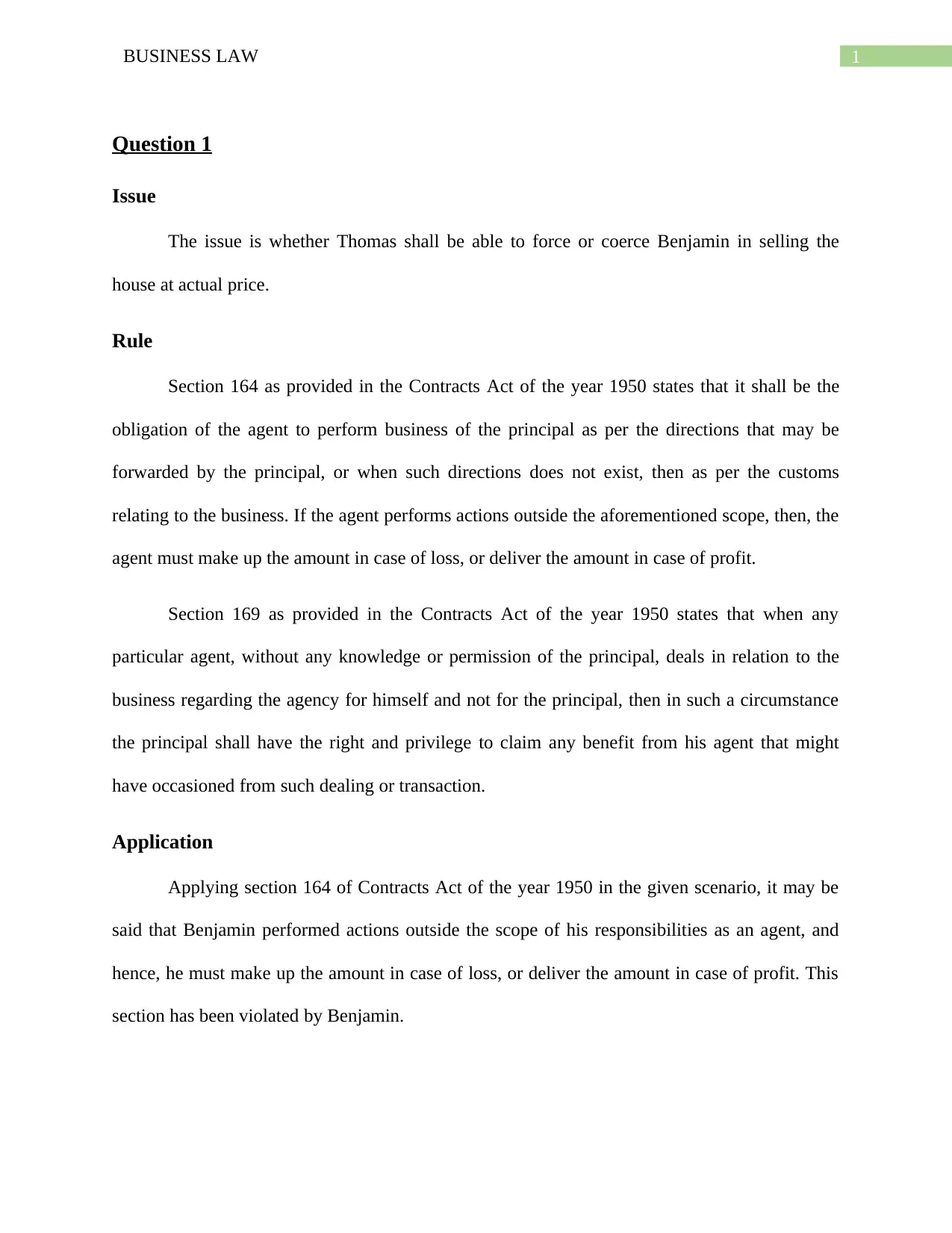
1BUSINESS LAW
Question 1
Issue
The issue is whether Thomas shall be able to force or coerce Benjamin in selling the
house at actual price.
Rule
Section 164 as provided in the Contracts Act of the year 1950 states that it shall be the
obligation of the agent to perform business of the principal as per the directions that may be
forwarded by the principal, or when such directions does not exist, then as per the customs
relating to the business. If the agent performs actions outside the aforementioned scope, then, the
agent must make up the amount in case of loss, or deliver the amount in case of profit.
Section 169 as provided in the Contracts Act of the year 1950 states that when any
particular agent, without any knowledge or permission of the principal, deals in relation to the
business regarding the agency for himself and not for the principal, then in such a circumstance
the principal shall have the right and privilege to claim any benefit from his agent that might
have occasioned from such dealing or transaction.
Application
Applying section 164 of Contracts Act of the year 1950 in the given scenario, it may be
said that Benjamin performed actions outside the scope of his responsibilities as an agent, and
hence, he must make up the amount in case of loss, or deliver the amount in case of profit. This
section has been violated by Benjamin.
Question 1
Issue
The issue is whether Thomas shall be able to force or coerce Benjamin in selling the
house at actual price.
Rule
Section 164 as provided in the Contracts Act of the year 1950 states that it shall be the
obligation of the agent to perform business of the principal as per the directions that may be
forwarded by the principal, or when such directions does not exist, then as per the customs
relating to the business. If the agent performs actions outside the aforementioned scope, then, the
agent must make up the amount in case of loss, or deliver the amount in case of profit.
Section 169 as provided in the Contracts Act of the year 1950 states that when any
particular agent, without any knowledge or permission of the principal, deals in relation to the
business regarding the agency for himself and not for the principal, then in such a circumstance
the principal shall have the right and privilege to claim any benefit from his agent that might
have occasioned from such dealing or transaction.
Application
Applying section 164 of Contracts Act of the year 1950 in the given scenario, it may be
said that Benjamin performed actions outside the scope of his responsibilities as an agent, and
hence, he must make up the amount in case of loss, or deliver the amount in case of profit. This
section has been violated by Benjamin.
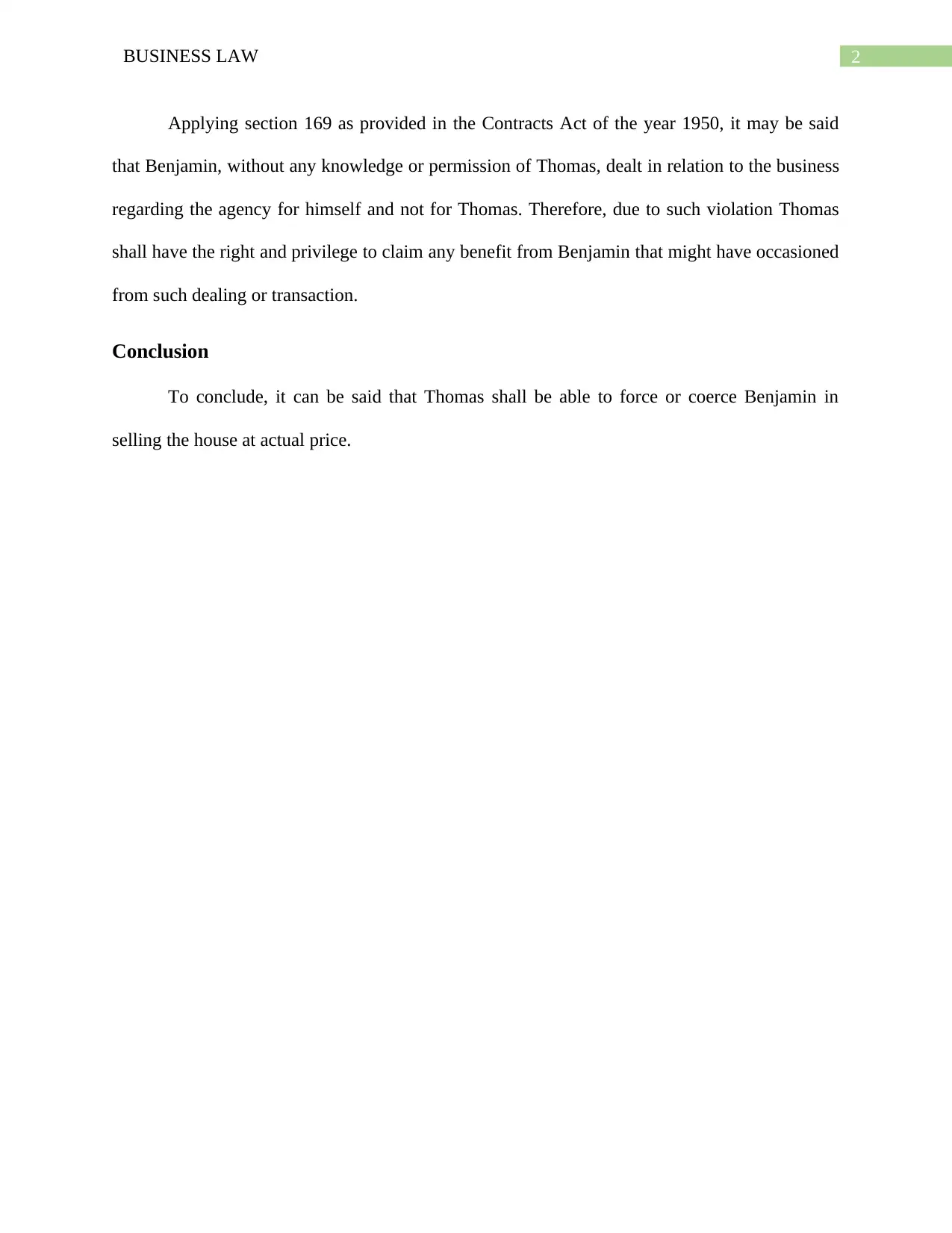
2BUSINESS LAW
Applying section 169 as provided in the Contracts Act of the year 1950, it may be said
that Benjamin, without any knowledge or permission of Thomas, dealt in relation to the business
regarding the agency for himself and not for Thomas. Therefore, due to such violation Thomas
shall have the right and privilege to claim any benefit from Benjamin that might have occasioned
from such dealing or transaction.
Conclusion
To conclude, it can be said that Thomas shall be able to force or coerce Benjamin in
selling the house at actual price.
Applying section 169 as provided in the Contracts Act of the year 1950, it may be said
that Benjamin, without any knowledge or permission of Thomas, dealt in relation to the business
regarding the agency for himself and not for Thomas. Therefore, due to such violation Thomas
shall have the right and privilege to claim any benefit from Benjamin that might have occasioned
from such dealing or transaction.
Conclusion
To conclude, it can be said that Thomas shall be able to force or coerce Benjamin in
selling the house at actual price.
⊘ This is a preview!⊘
Do you want full access?
Subscribe today to unlock all pages.

Trusted by 1+ million students worldwide
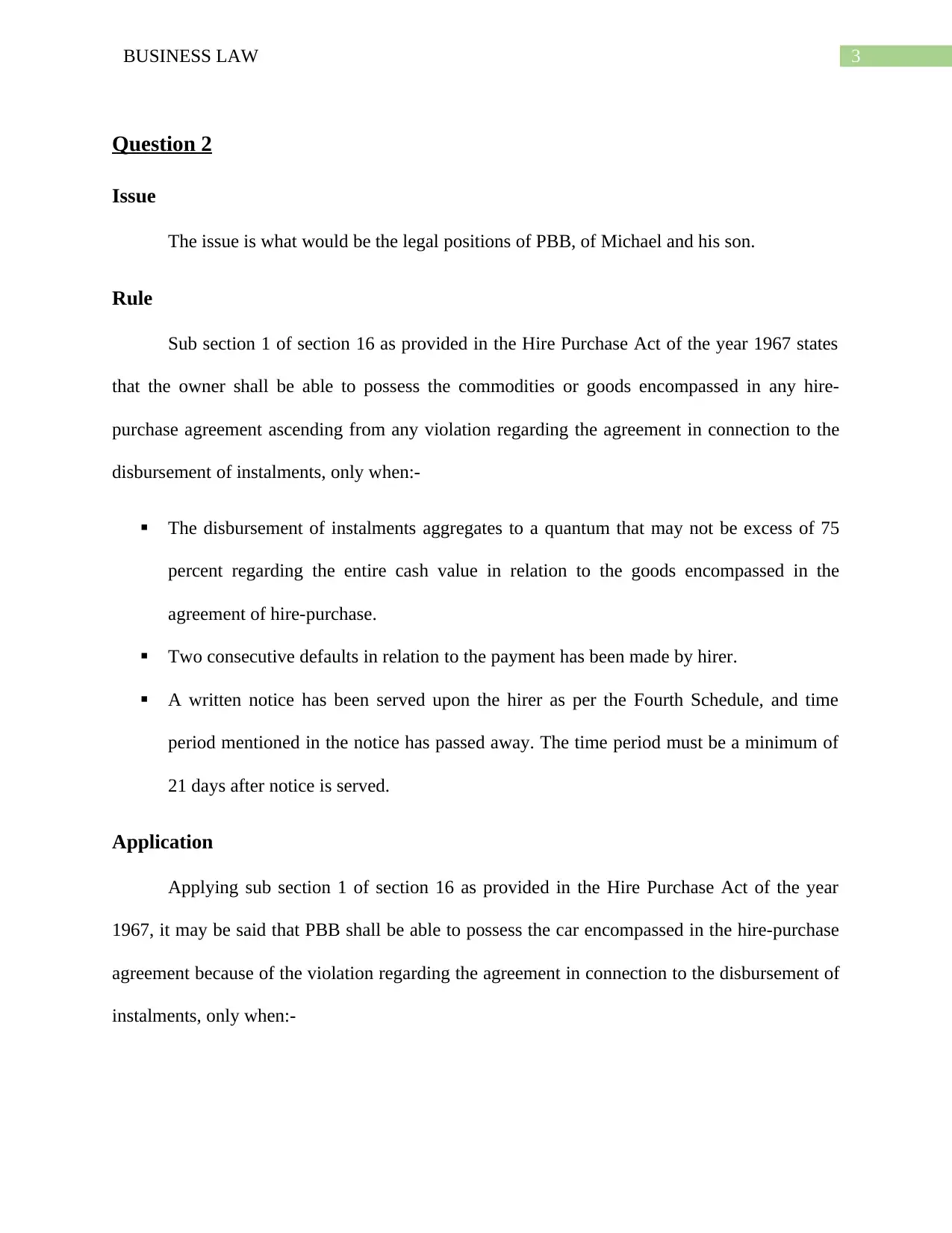
3BUSINESS LAW
Question 2
Issue
The issue is what would be the legal positions of PBB, of Michael and his son.
Rule
Sub section 1 of section 16 as provided in the Hire Purchase Act of the year 1967 states
that the owner shall be able to possess the commodities or goods encompassed in any hire-
purchase agreement ascending from any violation regarding the agreement in connection to the
disbursement of instalments, only when:-
The disbursement of instalments aggregates to a quantum that may not be excess of 75
percent regarding the entire cash value in relation to the goods encompassed in the
agreement of hire-purchase.
Two consecutive defaults in relation to the payment has been made by hirer.
A written notice has been served upon the hirer as per the Fourth Schedule, and time
period mentioned in the notice has passed away. The time period must be a minimum of
21 days after notice is served.
Application
Applying sub section 1 of section 16 as provided in the Hire Purchase Act of the year
1967, it may be said that PBB shall be able to possess the car encompassed in the hire-purchase
agreement because of the violation regarding the agreement in connection to the disbursement of
instalments, only when:-
Question 2
Issue
The issue is what would be the legal positions of PBB, of Michael and his son.
Rule
Sub section 1 of section 16 as provided in the Hire Purchase Act of the year 1967 states
that the owner shall be able to possess the commodities or goods encompassed in any hire-
purchase agreement ascending from any violation regarding the agreement in connection to the
disbursement of instalments, only when:-
The disbursement of instalments aggregates to a quantum that may not be excess of 75
percent regarding the entire cash value in relation to the goods encompassed in the
agreement of hire-purchase.
Two consecutive defaults in relation to the payment has been made by hirer.
A written notice has been served upon the hirer as per the Fourth Schedule, and time
period mentioned in the notice has passed away. The time period must be a minimum of
21 days after notice is served.
Application
Applying sub section 1 of section 16 as provided in the Hire Purchase Act of the year
1967, it may be said that PBB shall be able to possess the car encompassed in the hire-purchase
agreement because of the violation regarding the agreement in connection to the disbursement of
instalments, only when:-
Paraphrase This Document
Need a fresh take? Get an instant paraphrase of this document with our AI Paraphraser
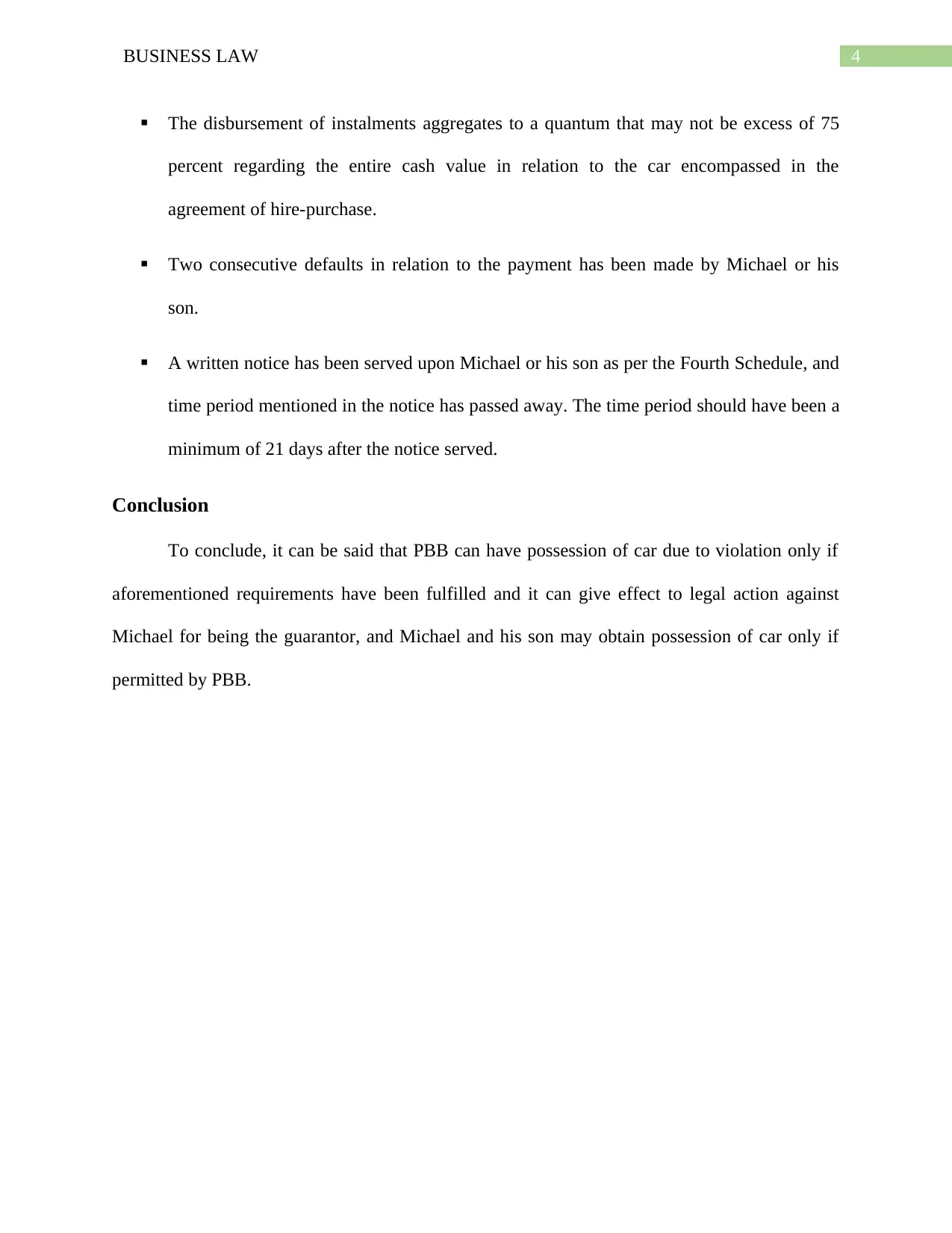
4BUSINESS LAW
The disbursement of instalments aggregates to a quantum that may not be excess of 75
percent regarding the entire cash value in relation to the car encompassed in the
agreement of hire-purchase.
Two consecutive defaults in relation to the payment has been made by Michael or his
son.
A written notice has been served upon Michael or his son as per the Fourth Schedule, and
time period mentioned in the notice has passed away. The time period should have been a
minimum of 21 days after the notice served.
Conclusion
To conclude, it can be said that PBB can have possession of car due to violation only if
aforementioned requirements have been fulfilled and it can give effect to legal action against
Michael for being the guarantor, and Michael and his son may obtain possession of car only if
permitted by PBB.
The disbursement of instalments aggregates to a quantum that may not be excess of 75
percent regarding the entire cash value in relation to the car encompassed in the
agreement of hire-purchase.
Two consecutive defaults in relation to the payment has been made by Michael or his
son.
A written notice has been served upon Michael or his son as per the Fourth Schedule, and
time period mentioned in the notice has passed away. The time period should have been a
minimum of 21 days after the notice served.
Conclusion
To conclude, it can be said that PBB can have possession of car due to violation only if
aforementioned requirements have been fulfilled and it can give effect to legal action against
Michael for being the guarantor, and Michael and his son may obtain possession of car only if
permitted by PBB.
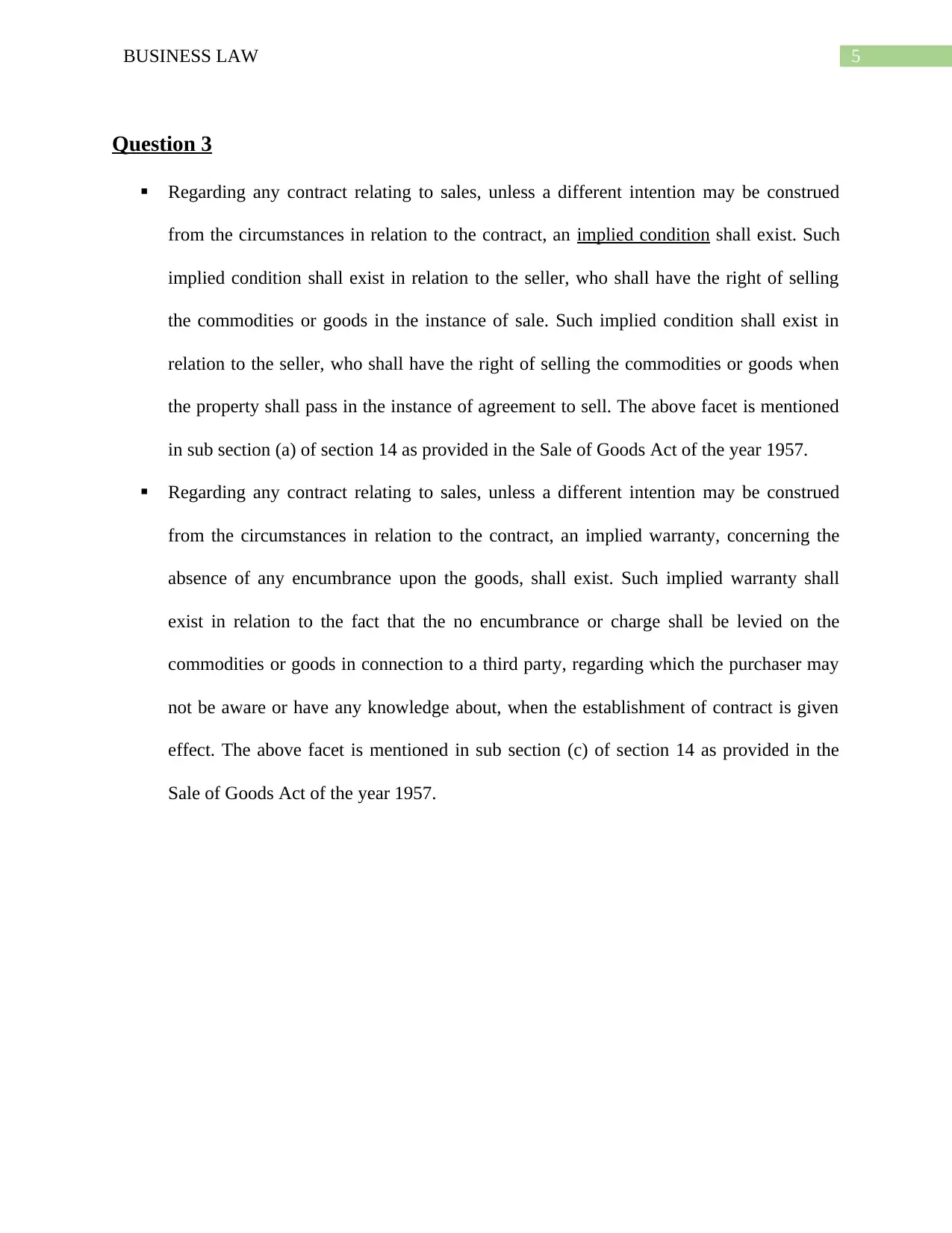
5BUSINESS LAW
Question 3
Regarding any contract relating to sales, unless a different intention may be construed
from the circumstances in relation to the contract, an implied condition shall exist. Such
implied condition shall exist in relation to the seller, who shall have the right of selling
the commodities or goods in the instance of sale. Such implied condition shall exist in
relation to the seller, who shall have the right of selling the commodities or goods when
the property shall pass in the instance of agreement to sell. The above facet is mentioned
in sub section (a) of section 14 as provided in the Sale of Goods Act of the year 1957.
Regarding any contract relating to sales, unless a different intention may be construed
from the circumstances in relation to the contract, an implied warranty, concerning the
absence of any encumbrance upon the goods, shall exist. Such implied warranty shall
exist in relation to the fact that the no encumbrance or charge shall be levied on the
commodities or goods in connection to a third party, regarding which the purchaser may
not be aware or have any knowledge about, when the establishment of contract is given
effect. The above facet is mentioned in sub section (c) of section 14 as provided in the
Sale of Goods Act of the year 1957.
Question 3
Regarding any contract relating to sales, unless a different intention may be construed
from the circumstances in relation to the contract, an implied condition shall exist. Such
implied condition shall exist in relation to the seller, who shall have the right of selling
the commodities or goods in the instance of sale. Such implied condition shall exist in
relation to the seller, who shall have the right of selling the commodities or goods when
the property shall pass in the instance of agreement to sell. The above facet is mentioned
in sub section (a) of section 14 as provided in the Sale of Goods Act of the year 1957.
Regarding any contract relating to sales, unless a different intention may be construed
from the circumstances in relation to the contract, an implied warranty, concerning the
absence of any encumbrance upon the goods, shall exist. Such implied warranty shall
exist in relation to the fact that the no encumbrance or charge shall be levied on the
commodities or goods in connection to a third party, regarding which the purchaser may
not be aware or have any knowledge about, when the establishment of contract is given
effect. The above facet is mentioned in sub section (c) of section 14 as provided in the
Sale of Goods Act of the year 1957.
⊘ This is a preview!⊘
Do you want full access?
Subscribe today to unlock all pages.

Trusted by 1+ million students worldwide
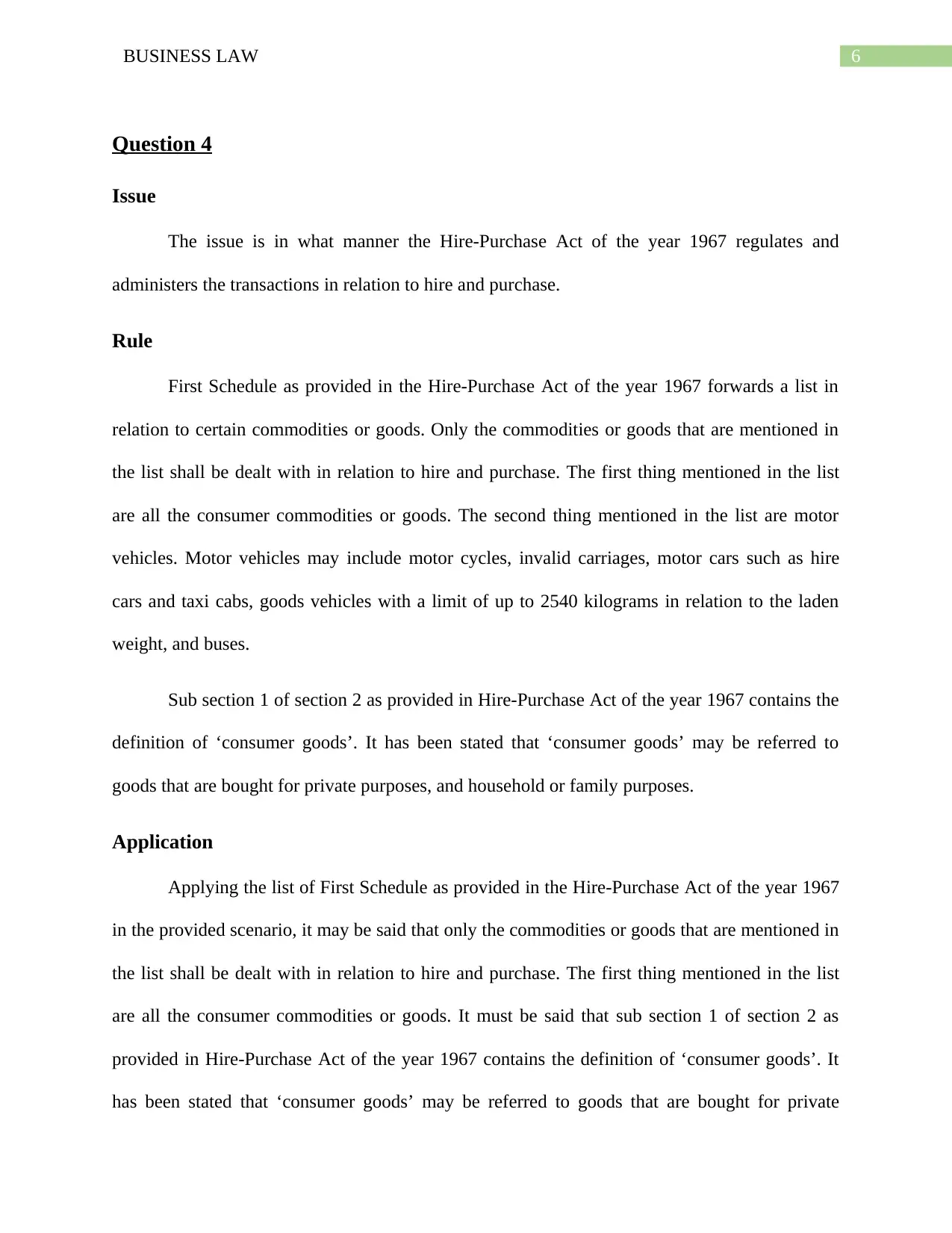
6BUSINESS LAW
Question 4
Issue
The issue is in what manner the Hire-Purchase Act of the year 1967 regulates and
administers the transactions in relation to hire and purchase.
Rule
First Schedule as provided in the Hire-Purchase Act of the year 1967 forwards a list in
relation to certain commodities or goods. Only the commodities or goods that are mentioned in
the list shall be dealt with in relation to hire and purchase. The first thing mentioned in the list
are all the consumer commodities or goods. The second thing mentioned in the list are motor
vehicles. Motor vehicles may include motor cycles, invalid carriages, motor cars such as hire
cars and taxi cabs, goods vehicles with a limit of up to 2540 kilograms in relation to the laden
weight, and buses.
Sub section 1 of section 2 as provided in Hire-Purchase Act of the year 1967 contains the
definition of ‘consumer goods’. It has been stated that ‘consumer goods’ may be referred to
goods that are bought for private purposes, and household or family purposes.
Application
Applying the list of First Schedule as provided in the Hire-Purchase Act of the year 1967
in the provided scenario, it may be said that only the commodities or goods that are mentioned in
the list shall be dealt with in relation to hire and purchase. The first thing mentioned in the list
are all the consumer commodities or goods. It must be said that sub section 1 of section 2 as
provided in Hire-Purchase Act of the year 1967 contains the definition of ‘consumer goods’. It
has been stated that ‘consumer goods’ may be referred to goods that are bought for private
Question 4
Issue
The issue is in what manner the Hire-Purchase Act of the year 1967 regulates and
administers the transactions in relation to hire and purchase.
Rule
First Schedule as provided in the Hire-Purchase Act of the year 1967 forwards a list in
relation to certain commodities or goods. Only the commodities or goods that are mentioned in
the list shall be dealt with in relation to hire and purchase. The first thing mentioned in the list
are all the consumer commodities or goods. The second thing mentioned in the list are motor
vehicles. Motor vehicles may include motor cycles, invalid carriages, motor cars such as hire
cars and taxi cabs, goods vehicles with a limit of up to 2540 kilograms in relation to the laden
weight, and buses.
Sub section 1 of section 2 as provided in Hire-Purchase Act of the year 1967 contains the
definition of ‘consumer goods’. It has been stated that ‘consumer goods’ may be referred to
goods that are bought for private purposes, and household or family purposes.
Application
Applying the list of First Schedule as provided in the Hire-Purchase Act of the year 1967
in the provided scenario, it may be said that only the commodities or goods that are mentioned in
the list shall be dealt with in relation to hire and purchase. The first thing mentioned in the list
are all the consumer commodities or goods. It must be said that sub section 1 of section 2 as
provided in Hire-Purchase Act of the year 1967 contains the definition of ‘consumer goods’. It
has been stated that ‘consumer goods’ may be referred to goods that are bought for private
Paraphrase This Document
Need a fresh take? Get an instant paraphrase of this document with our AI Paraphraser
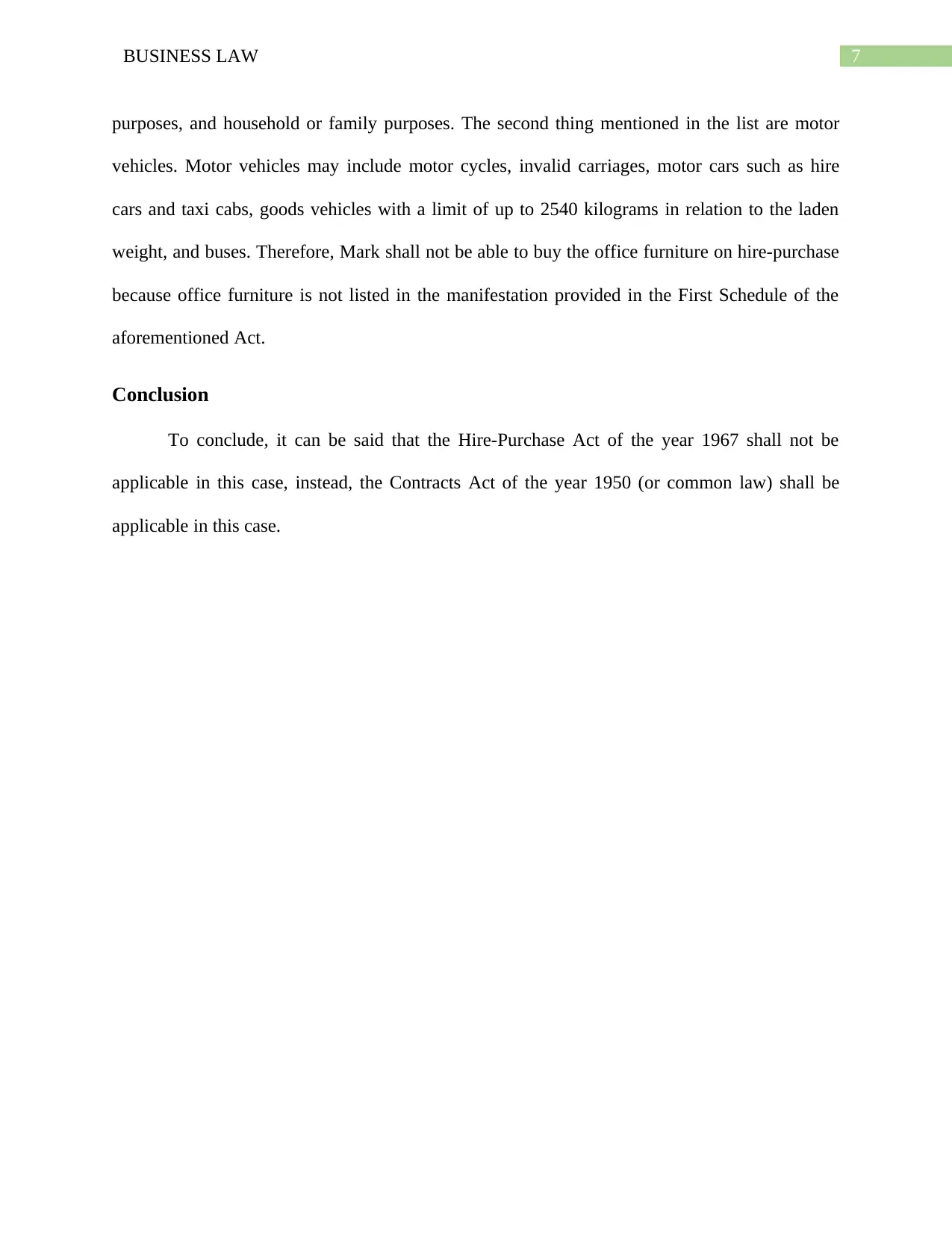
7BUSINESS LAW
purposes, and household or family purposes. The second thing mentioned in the list are motor
vehicles. Motor vehicles may include motor cycles, invalid carriages, motor cars such as hire
cars and taxi cabs, goods vehicles with a limit of up to 2540 kilograms in relation to the laden
weight, and buses. Therefore, Mark shall not be able to buy the office furniture on hire-purchase
because office furniture is not listed in the manifestation provided in the First Schedule of the
aforementioned Act.
Conclusion
To conclude, it can be said that the Hire-Purchase Act of the year 1967 shall not be
applicable in this case, instead, the Contracts Act of the year 1950 (or common law) shall be
applicable in this case.
purposes, and household or family purposes. The second thing mentioned in the list are motor
vehicles. Motor vehicles may include motor cycles, invalid carriages, motor cars such as hire
cars and taxi cabs, goods vehicles with a limit of up to 2540 kilograms in relation to the laden
weight, and buses. Therefore, Mark shall not be able to buy the office furniture on hire-purchase
because office furniture is not listed in the manifestation provided in the First Schedule of the
aforementioned Act.
Conclusion
To conclude, it can be said that the Hire-Purchase Act of the year 1967 shall not be
applicable in this case, instead, the Contracts Act of the year 1950 (or common law) shall be
applicable in this case.
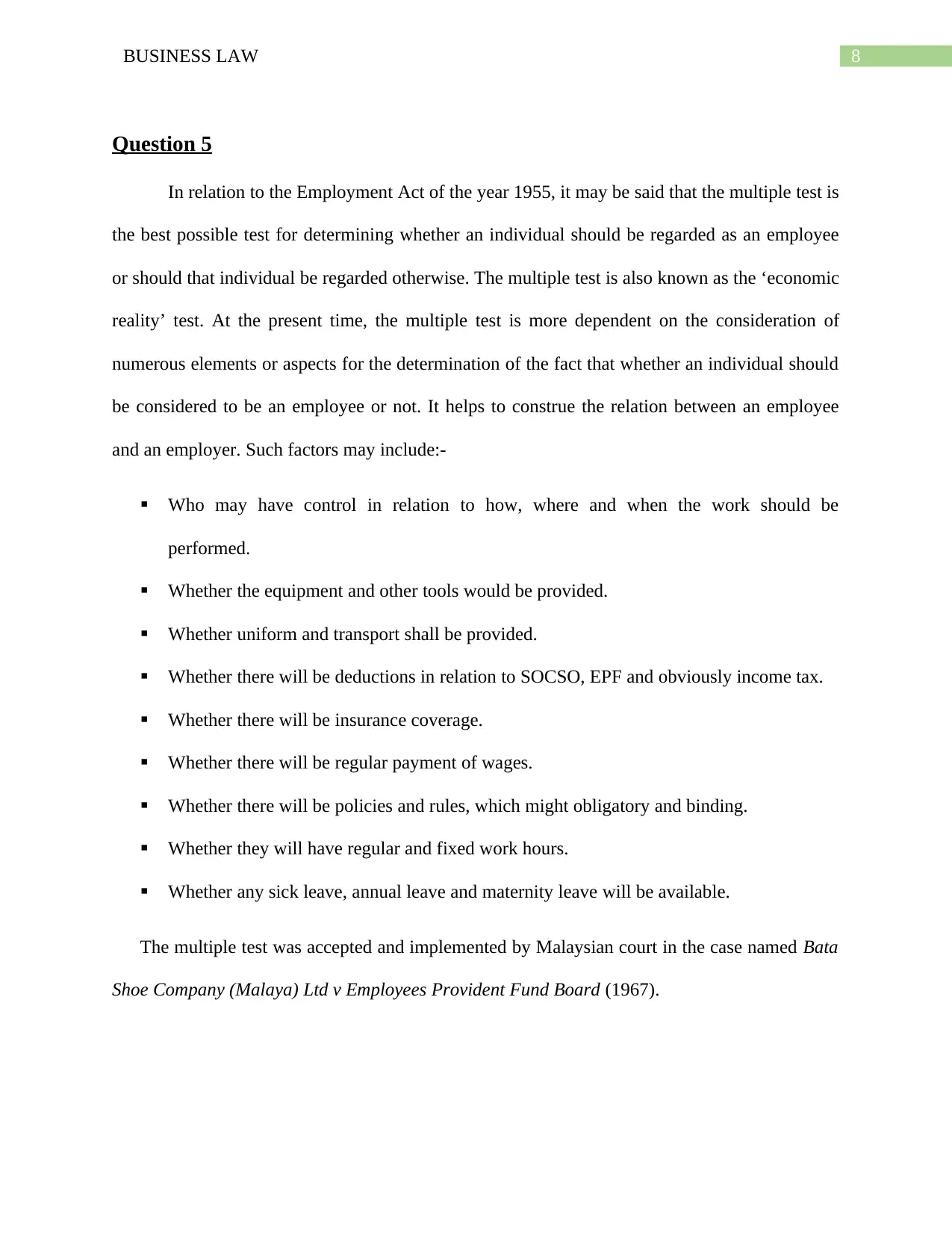
8BUSINESS LAW
Question 5
In relation to the Employment Act of the year 1955, it may be said that the multiple test is
the best possible test for determining whether an individual should be regarded as an employee
or should that individual be regarded otherwise. The multiple test is also known as the ‘economic
reality’ test. At the present time, the multiple test is more dependent on the consideration of
numerous elements or aspects for the determination of the fact that whether an individual should
be considered to be an employee or not. It helps to construe the relation between an employee
and an employer. Such factors may include:-
Who may have control in relation to how, where and when the work should be
performed.
Whether the equipment and other tools would be provided.
Whether uniform and transport shall be provided.
Whether there will be deductions in relation to SOCSO, EPF and obviously income tax.
Whether there will be insurance coverage.
Whether there will be regular payment of wages.
Whether there will be policies and rules, which might obligatory and binding.
Whether they will have regular and fixed work hours.
Whether any sick leave, annual leave and maternity leave will be available.
The multiple test was accepted and implemented by Malaysian court in the case named Bata
Shoe Company (Malaya) Ltd v Employees Provident Fund Board (1967).
Question 5
In relation to the Employment Act of the year 1955, it may be said that the multiple test is
the best possible test for determining whether an individual should be regarded as an employee
or should that individual be regarded otherwise. The multiple test is also known as the ‘economic
reality’ test. At the present time, the multiple test is more dependent on the consideration of
numerous elements or aspects for the determination of the fact that whether an individual should
be considered to be an employee or not. It helps to construe the relation between an employee
and an employer. Such factors may include:-
Who may have control in relation to how, where and when the work should be
performed.
Whether the equipment and other tools would be provided.
Whether uniform and transport shall be provided.
Whether there will be deductions in relation to SOCSO, EPF and obviously income tax.
Whether there will be insurance coverage.
Whether there will be regular payment of wages.
Whether there will be policies and rules, which might obligatory and binding.
Whether they will have regular and fixed work hours.
Whether any sick leave, annual leave and maternity leave will be available.
The multiple test was accepted and implemented by Malaysian court in the case named Bata
Shoe Company (Malaya) Ltd v Employees Provident Fund Board (1967).
⊘ This is a preview!⊘
Do you want full access?
Subscribe today to unlock all pages.

Trusted by 1+ million students worldwide
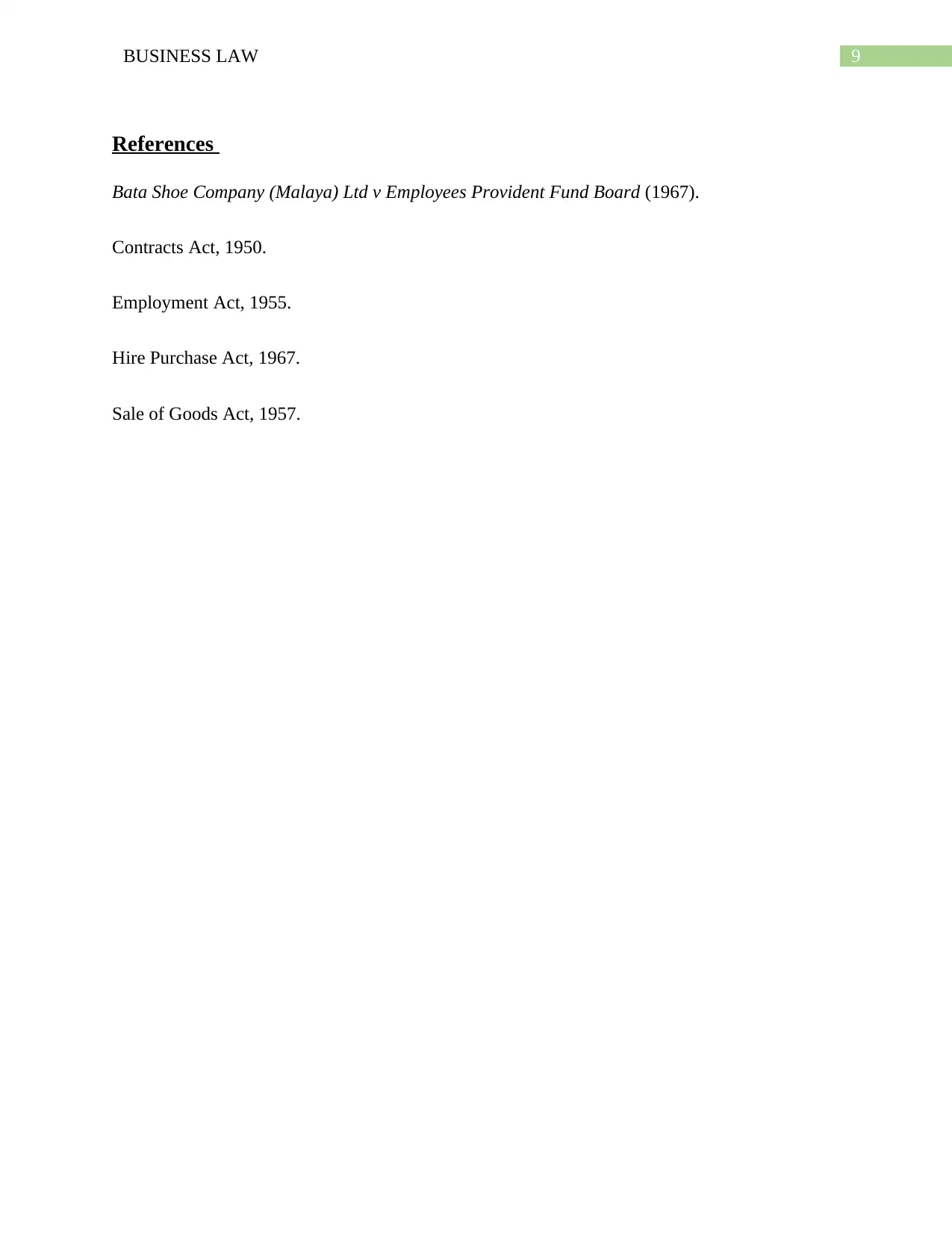
9BUSINESS LAW
References
Bata Shoe Company (Malaya) Ltd v Employees Provident Fund Board (1967).
Contracts Act, 1950.
Employment Act, 1955.
Hire Purchase Act, 1967.
Sale of Goods Act, 1957.
References
Bata Shoe Company (Malaya) Ltd v Employees Provident Fund Board (1967).
Contracts Act, 1950.
Employment Act, 1955.
Hire Purchase Act, 1967.
Sale of Goods Act, 1957.
1 out of 10
Your All-in-One AI-Powered Toolkit for Academic Success.
+13062052269
info@desklib.com
Available 24*7 on WhatsApp / Email
![[object Object]](/_next/static/media/star-bottom.7253800d.svg)
Unlock your academic potential
Copyright © 2020–2025 A2Z Services. All Rights Reserved. Developed and managed by ZUCOL.